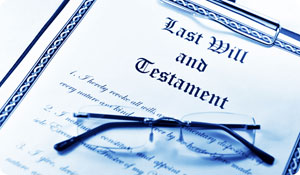
As uncomfortable as it may be to plan ahead for a time when you won't be here, consider what could happen if you don't. Dying without a will could cause your family a great deal of confusion, expense and, possibly, major squabbles. Here's how to avoid all that.
Start With Estate Planning
Estate planning means nothing more than having a strategy in place to transfer your money and property to someone else. Every adult, young and old, can benefit from estate planning because, no matter what you own, an advance plan gives you the opportunity to decide who gets your belongings when you are no longer here to give them away yourself.
Estate planning is especially important if you have children under the age of 18, because you need to decide who will take care of them if you are not able and who will manage any assets they inherit if you die before they come of age.
To begin the process:
- Take inventory of your personal assets. Include your home, car, furniture, electronic equipment, and any money you have in savings accounts, checking accounts, stocks, bonds, funds, pension plans, insurance, and annuities.
- Decide who your beneficiaries will be. If your children are under 18, also choose an adult who will manage their finances.
- Assign a health care power of attorney. This is essentially any person over the age of 18 who is not being paid to take care of you and who is capable of making the types of decisions you would make for yourself in the event you are disabled or incapacitated in such a way that you cannot take care of your own financial and medical decisions. Your health care power of attorney will have only as much power as you transfer and can only exercise that power if you are not capable of making your own decisions.
- Write a living will. A living will conveys your wishes about the use of life support techniques when there is no hope of recovery from an illness or accident. When you have a living will in place, you unburden family members from making such a decision.
- Designate someone to handle any online accounts. If you own a website or are active in social media, you may want to include a statement in your estate plan about how to handle your online identity once you are gone. You can appoint someone specific to close out any email addresses, blogs, or other online accounts. This person should be someone you trust to keep a list of your user names and passwords while you are still alive.
Write Your Will
Legally, you can plan your estate on your own and leave a hand-written will stating all of your wishes without the help of an attorney. However, most people are more comfortable getting legal advice from an attorney who specializes in estate planning who can advise on state laws concerning wills and trusts. An attorney can also:
- Ensure that your will is written in such a way that your property actually goes where you intend.
- Determine that there is a legal basis for the decisions you make.
- Advise you on financial options that could save you and your heirs money, and on matters such as guardianship for your children.
You must choose an executor, or a person who is in charge of settling your estate when you die. This can be an attorney or any other person you choose who is over the age of 18 and has never been convicted of a felony.
Update Your Will
From time to time, it is likely that you will want to update your will to include new family members, exclude former heirs, comply with new state or tax laws, or address changes in wealth or marital status. Make sure you sign off on these changes and that your new will is dated and witnessed so that it legally supercedes your old will.
Sources:
MHNet. Writing a Will-Frequently Asked Questions. Web.
http://www.fit.edu/hr/documents/doc_mgr/647/January-2012.pdf
U.S. Government. Writing a Will. Mar 2012. Web.
http://www.usa.gov/topics/money/personal-finance/wills.shtml
Utah State University Extension. Estate Planning Basics: Getting Started. Web.
http://extension.usu.edu/bankruptcy/files/uploads/ff16.pdf





